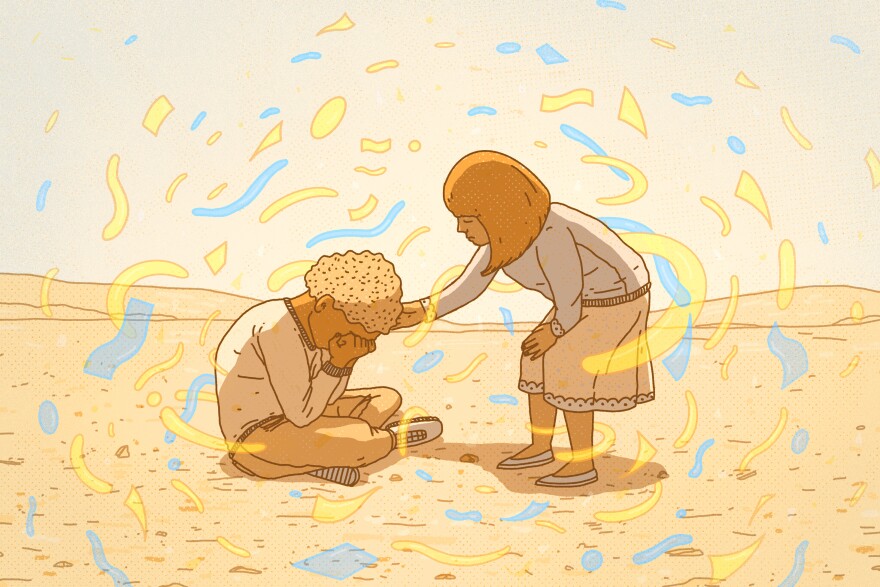Are humans born kind?
We both assumed, as parents of young children, that kindness is just something our kids would pick up by osmosis, because we love them. It's a common assumption.
"We often just expect people to be kind without talking about it," says Jennifer Kotler, vice president of research and evaluation at Sesame Workshop. "We think, 'Oh, you're a good kid. You're gonna be kind.' "
Now, that's not entirely wrong. Humans are certainly born with a capacity to be kind — even leaning toward kindness in many situations.
We have neurons in our brains, called mirror neurons, and they respond in the same way when we experience pain, say by being pricked with a needle, as they do when we see someone else experience the same thing.
We also see signs of what is called empathic distress even in babies, says Thomas Lickona, a psychologist and author of How to Raise Kind Kids.
"Soon after birth, children will be more likely to cry as a result of hearing another child cry than in response to any other sort of noise," says Lickona.
But kindness is about more than sensing someone else's pain. It's also about wanting to do something about it — and then actually being helpful. Lickona says kids show an early preference for helping, too.
In one study, when toddlers observed an adult appear to accidentally drop something, nearly every one of them responded by helping, usually within seconds, Lickona says. "And they did this without any request from the adult and without even being thanked by the adult. And it didn't matter whether or not the parent was in the room."
In fact, this preference for helping shows up even earlier. Kiley Hamlin is an associate professor of psychology at the University of British Columbia, and she has used puppets to test this preference in babies.
Hamlin had infants watch as a puppet looked longingly up a hill it wanted to climb. When the puppet tried, though, one of two things happened: Either a helper puppet gave the climber a boost up the hill or, once at the top, the climber puppet got bumped back down by a hinderer puppet. Hamlin then put the helper and hinderer in front of the babies and waited to see which one they preferred.
"The surprising thing was the sheer number of babies who were showing this preference for the helper," says Hamlin.
Loading...
Don't see the graphic above? Click here
Between 75% and 100% of babies in these studies tend to reach for, or look longer at, the helper puppet rather than the meanie, Hamlin says. This suggests that even babies are picking up on "who has goals that need help, who did what to whom, who's a good guy, who's a bad guy, and that they're using this understanding in order to structure sort of their own social preferences."
As we said, in some ways, kids are born kind.
But there are also big barriers to kindness. For example, in one small study, children who were roughly 2 years old witnessed other kids in distress. Perhaps a fellow child fell on the playground, though not necessarily someone they knew. In only a third of these situations did the bystander children respond with altruism — going over to the child, offering a hug, or calling for an adult.
What gets in the way of kindness? Lots of things. For one, young kids are naturally self-centered. The ability to take others' perspective is something they have to develop through experience.
There's also temperament. Some kids really can't handle other kids' pain. Or maybe they're shy, or not sure what to do, and they wait for someone else to step up.
But there's another, more disturbing barrier to kindness: Tribalism. Not just a preference for those who look and act like us but even a desire to see those not like us treated badly.
In a University of Toronto study, infants as young as six months old showed a preference for members of their own race and against members of different races. And this us vs. them mentality extends beyond physical differences.
Hamlin, at the University of British Columbia, introduced a new variable to her puppet shows. When the puppet and baby liked different snacks, the baby wasn't just less kind. She often wanted the puppet that did not share her snack preference punished.
"Babies did seem to care more about who was like them than they cared about niceness and meanness," says Hamlin.
"So here's a real forerunner, evident as early as six months of age, of what becomes ugly prejudice, discrimination and so on later on," says Tom Lickona.
No surprise, much of the hard work of cultivating a more consistent kindness in children — especially toward people who aren't like them — falls to parents, teachers, and the rest of us grown-ups.
Remember that study of the kids who observed fellow children in distress? The ones who were most likely to help had mothers who were warm and nurturing but also gave direct and firm moral instruction. (The study only examined mothers). These mothers took it very seriously when their child harmed another child. Lickona says they gave clear correction, and did so with feeling. For example, "You hurt Amy. Pulling hair hurts. Neverpull hair ."
The message? Hurting is a big deal.
"As a result, the child was more likely to take it seriously later on and respond compassionately when she saw another child crying on the playground," Lickona says.
Turns out, kindness is complicated. We're born with the wiring for both kindness and cruelty, so altruism is not inevitable. It's a skill and a habit that we have the power — and responsibility — to foster, one good deed at a time.
Copyright 2020 NPR. To see more, visit https://www.npr.org. 9(MDAyMTYyMTU5MDEyOTc4NzE4ODNmYWEwYQ004))










